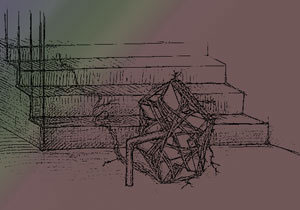
And now a word on Odradek. Odradek is an entity that appears in a very short story by Kafka titled The Worries of a head of Household, which is in turn part of the larger collection titled A Country Doctor. Odradek is a thing of indeterminate composition; ‘star shaped’ and seemingly incorporating broken tangled bits of thread within it. It seems without function, not ever to have had a function, and yet its presence is continually noted, being found hanging around in doorways or at the bottom of stairs. The presence of Odradek seems to elicit some anxiety in the head of household who speculates on its origins and even whether it can die. Its worn down broken nature seems to be the whole of it, not the result of some or other process that has caused a once useful thing to fall into disrepair. It is what it is; Odradek, a nonsense signifier, an ex-sistant thing that is always there despite its apparent uselessness.
Marxian analysis has described it as a surplus in the sense of dead labour and surplus value which stands before the worker as an alien thing, embodying that life force that has been taken from him and never to be recovered. Marx wrote of the labour of the worker being embodied as dead labour in the machinery which is then worked on by future workers, and as such has this quality that continues after the death of its originators. In Lacanian terms Odradek is that unsymbolisable Real that forms the kernel of our being, a kind of undead thing that persists almost suggesting its persistence beyond death itself. I’m not sure if this means that Odradek could be equated with a more general form of object (a) or as a spectre indicating our own broken down incomplete nature. If it were the latter this would suggest more of a relation with Lacan’s mathem S(A), the signifier for the lack, or incompleteness in the Other. Certainly it is not a symptom or fetish, for a fetish allows the subject to abrogate the anxiety of reality by endowing the object with quasi-mystical properties, mistaking it for the thing in itself.
Perhaps it is best to describe Odradek as a materialisation of that surplus jouissance that is lost by the subject upon entering the symbolic order and that as such resists symbolisation. It can therefore only appear as an indeterminate 'something' creating anxiety and highlighting the very incompleteness of reality. The reference to Odradek falling at the feet of the children and grandchildren of the head of household can be interpreted as that quality of object (a), that surplus that parents embody in their children in an attempt to make real and reclaim it in the world. Always failing, and yet as we die that libidinal surplus lives on embedded in our offspring and continuing to play the same role in their lives. Odradek is the general form for that immortal, inhuman part of the subject that insists rather than exists.
Xaven Taner
Februrary 2010